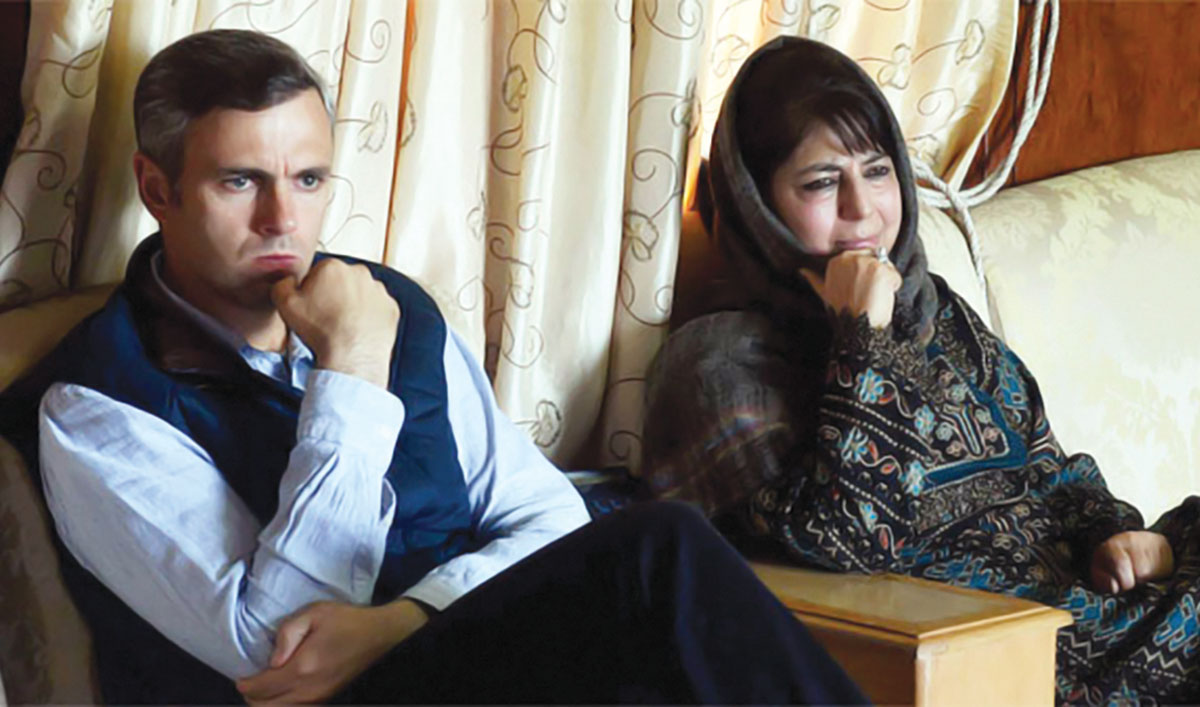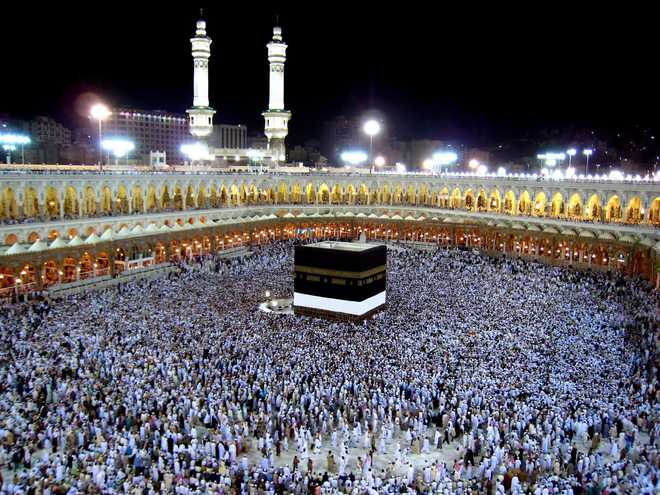Jammu and Kashmir’s five-time Chief Minister and the most senior politician, Dr Farooq Abdullah, skipped a Lok Sabha contest on health grounds. Is he on his way to an exit or has he already retired, reports Humaira Nabi
This election season, one interesting development was on display. In the Jammu and Kashmir National Conference (JKNC), Omar Abdullah, the party’s Vice President, was in sharp focus, with two generations on the margins. On September 30, 2023, when Omar launched the party’s election campaign for Lok Sabha in Ladakh, the influential clan’s fourth generation was part of the photo frame. Zamir and Zahir, the two lawyer sons of Omar were part of the frame everywhere. The second generation, Dr Farooq Abdullah, the five times Chief Minister of Jammu and Kashmir, was busy campaigning for the party but skipped a contest.
On April 3, Omar during an election rally on the outskirts of Srinagar announced that party president; Farooq Abdullah would not contest the Lok Sabha due to health issues. “He (Farooq Abdullah) has taken permission from the party’s General Secretary and other party members to not contest the polls this time because of his health,” Omar stated.
The most high-profile leader of the region, Dr Farooq’s decision to not contest is being seen as his informal retirement.
Health Concerns
Farooq Abdullah has been grappling with health issues since his kidney transplant surgery in London in 2014, where his wife Molly Abdullah donated him a kidney. This was the key reason why Dr Abdullah lost his election to Tariq Hameed Karra, a seat he later regained when Karra deserted the PDP for Congress. He won the seat again in 2019. This time, however, Farooq did not contest. However, he actively is taking part in election rallies. The party’s biggest crowd-puller, he has travelled to remote and distant areas for the party. He may be down but is not out. He ensures that he stays in the headlines owing to his speeches, songs and jokes that keep him the most watched on social media. Aditya Sinha, his biographer and author of Farooq Abdullah: Kashmir’s Prodigal Son, termed his news-making capacity to his “temperamental instability”.
Off late, Farooq Abdullah appears to be in poor health. He is seen delivering most of his speeches while seated and requires assistance from his bodyguards to walk him to the podium.
“While it is very clear that Farooq Abdullah is not keeping well and there is a likelihood that his health is unlikely to allow him to run for office even in the Legislative Assembly,” political analyst Sheikh Showkat said. “At the same time, his official resignation from politics is far-fetched. It is very unlikely for politicians of the sub-continent to resign gracefully.”
Responding to these speculations, Omar recently said that his father not participating in the Lok Sabha elections does not mark the end of his political journey. He suggested that with his father, one should never dismiss possibilities. “With my father, I have learnt over time that you never say never. So until the very last breath and may God give him many more of them, do not ever write him off for anything,” Omar asserted.
Quick Shifts
In the 2002 Legislative Assembly elections, Omar Abdullah was chosen to lead the party as Farooq Abdullah intended to continue his political career at the Central level. So, Farooq went to the Rajya Sabha in 2002 and was re-elected again to the Upper House in 2009. He resigned from the Rajya Sabha in May 2009 and won Lok Sabha from Srinagar. Abdullah contested the Srinagar seat again in 2014 but was trounced by Karra. In 2017, Karra resigned, leading to a by-election for the Srinagar parliamentary seat. Farooq won again.
In June 2022, Farooq withdrew his name as an opposition candidate for presidential elections, saying he had a “lot more active politics” ahead of him, and that he wanted to contribute to navigating Jammu and Kashmir through the current “critical juncture”.
Post-2019
Farooq’s involvement in the region’s active politics after the reading down of Article 370 included his leadership role in the People’s Alliance on Gupkar Declaration (PAGD), a loose alliance aimed at fighting for the erstwhile state’s constitutional rights. Within four years of its takeoff, however, JKNC and PDP, the two main building blocks of the alliance made their disagreements over electoral politics public and the “stillborn” initiative grounded, reflecting a failure in Farooq’s leadership. The political grapevine was that Farooq Abdullah had claimed that his party did not consult him while deciding to go to the polls solo!
Interestingly, JKNC along with PDP joined the India-bloc, a country-wide opposition alliance led by Indian National Congress. On March 5, the JKNC’s Provisional President, Nasir Aslam Wani announced that his party will contest three Kashmir Lok Sabha seats on its own. The Congress then urged PDP leadership not to field candidates to prevent division of votes. PDP turned down the Congress plea and threw its hat in the ring only to prove that they exist on the ground.
“I told my party members that Farooq Abdullah is the senior leader from Jammu and Kashmir, and he will take a call on the seat-sharing issue in Kashmir. We were always steadfast in this statement of ours. We always thought of him as the PAGD leader,” Mehbooba said in a press conference. “If Farooq sahib had discussed it with us and said that his workers aren’t ready, or his legislators are not ready for seat sharing in the interest of people, we would have sacrificed not one but three seats. If they had decided after talking to us, at least the PAGD wouldn’t have fallen apart like this.”
Waheed Parra, now PDP’s poster boy and the candidate from Srinagar, even claimed that Farooq Abdullah was not a part of the JKNC decision-making process. “Farooq Sabh himself stated that he was unaware of the situation, mentioning that he didn’t have his phone with him when it was announced. His apparent disagreement is evident from his limited discussion about PADG since then,” he claimed. JKNC Imran Nabi has denied the claim asserting “Farooq sabh is actively taking part in party engagements. Waheed’s claim is a sheer lie,” he said. On February 15, Farooq Abdullah announced that JKNC would contest upcoming Lok Sabha polls on its own, indicating the party may exit from the INDIA alliance. Omar quickly refuted any such decision. “We were a part of the INDIA alliance and we still are. Things have been taken out of context by the media. The main idea of the grouping is to defeat the BJP for there is no point in sailing in two boats,” Omar said. These incidents suggest Dr Abdullah and Omar have disagreements.
Generation Shift
JKNC is not an ordinary party. A big daddy of politics in Jammu and Kashmir, it has been active since 1939 when it ‘upgraded’ itself from the Jammu and Kashmir Muslim Conference. Barring the 22 years between 1953 and 1975, when the party was literally by the Congress-backed Bakhshi Ghulam Mohammad; the party has remained in the control of the family. Right now, Kashmir has at least two surviving generations who have voted for Sheikh Abdullah. The party’s identity politics centred around Sheikh Abdullah and its symbol the plough, has played a crucial role in its longevity and success.
Over the years, the party’s administrative and control structure has not changed alone. It is a new generation in action with a completely different ecosystem. The land-to-tiller, slavery, despotic rule, agriculture revolution, Majehe Hund Eazat – 370 is not around. The new generation knows Sheikh Abdullah in history books and the governance structure is keen to erase him there as well. They have already dropped a public holiday on his birth anniversary. The historic JKNC is now for the researcher and perhaps not for the voter.
Are these the larger realities that the party has taken seriously? Is this all behind the situation in which the most respected JKNC leader is finding it slightly difficult to negotiate with the new generation? In post-2019, if nothing goes to Dr Farooq’s credit, he still managed to keep the party so tight with him that not even a single politician of his generation could leave the party. Those who deserted were from the new generation. Dr Farooq needs to be more than the party’s “campaigning mascot”. He must be the senior, the elder and the master, for the time being, the elder generation in the party insisted.














